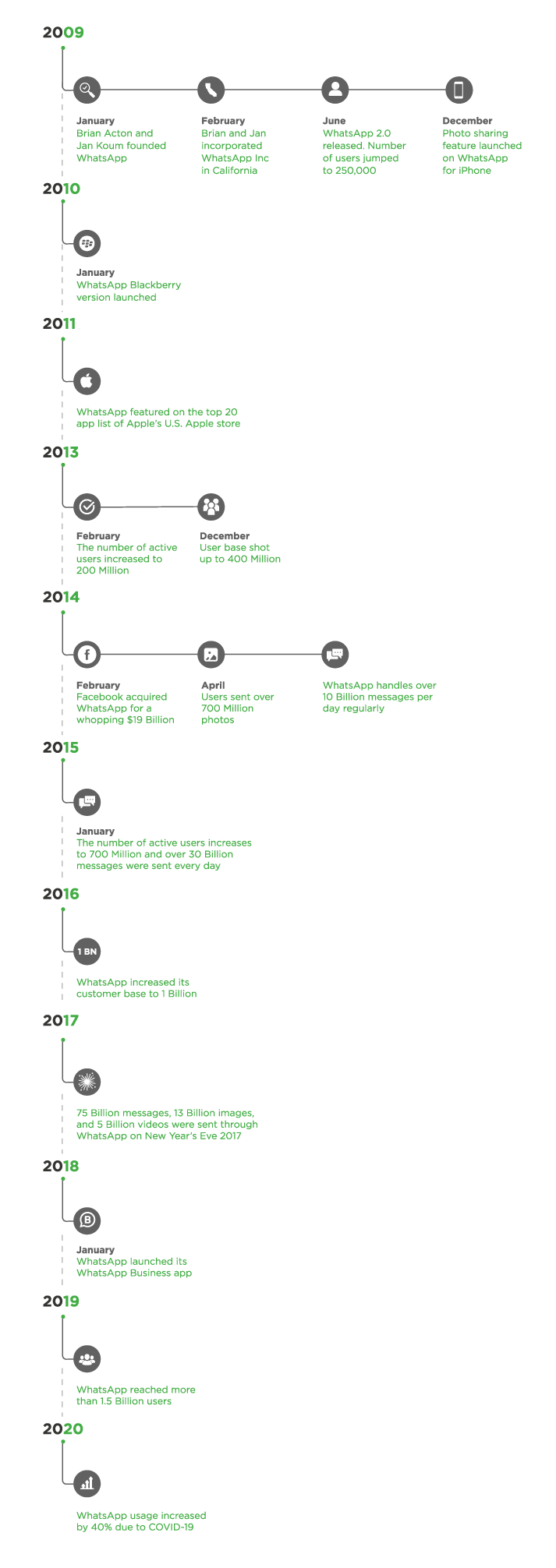
Jan Koum came up with the idea of ‘WhatsApp,’ in 2009, during a movie night with some friends. The app was supposed to be a platform to send quick notifications to others. But, Koum and Brian Acton evolved it to be an instant messaging app.
Koum and Acton spend some time together working at Yahoo! And their friendship grew. By 2007 they both quit their jobs and that was the start of their journey towards creating one the world’s largest mobile messaging platforms. WhatsApp made instant messaging affordable and raised the standard of communication.
Between 2009 and 2020, WhatsApp has transformed the way we communicate, globally. Today more than 2 billion people use the platform to talk to their loved ones – their friends and family, and also to interact with businesses, resolve queries, and make purchases. Learning more about WhatsApp can help you make business communication simpler, easier, and more secure. WhatsApp is growing to become the center of communication for billions of users all around the world.
Learning more about WhatsApp can help you make business communication simpler, easier, and more secure. WhatsApp is growing to become the center of communication for billions of users all around the world.
A great way to remain relevant and keep up with the latest marketing trends is through data. Facts speak for themselves! We’ve gone through websites, research papers, blogs, and more to create a consolidated list of WhatsApp statistics to help you understand it better.
| Statistic | Source | Year |
|---|---|---|
| More than 2 billion people, globally, use WhatsApp | LiveMint | 2020 |
| India is WhatsApp’s biggest market, with 400 million users | TechCrunch | 2019 |
| Brazil is the second-largest market with 99 million WhatsApp users | Statista | 2019 |
| Saudi Arabia has the largest percentage of active WhatsApp users – 73% | Statista | 2019 |
| 58% of people in the UK use WhatsApp | DIW | 2019 |
| WhatsApp’s customer base is spread across 180+ countries | 2020 | |
| The countries with the highest market penetration, for WhatsApp, are Netherlands (85%), followed by Spain (83.1%), and Italy (83%) | Fortunly | 2020 |
| With 23 million users, the US is a relatively small market for WhatsApp | DIW | 2019 |
| In the US, WhatsApp usage is the highest among young adults aged between 18 and 24, which comprises 44 percent of the users | Oberlo | 2020 |
| Statistic | Source | Year |
|---|---|---|
| With 96 million installations, WhatsApp was the second most installed non-game app worldwide, in February 2020 | SensorTower | 2020 |
| iOS users in the United States generated 2.75 million WhatsApp downloads in the first quarter of 2020 | Statista | 2020 |
| On average, 1 million people register on WhatsApp daily | Dustn.tv | 2020 |
| WhatsApp registered 7.8 billion downloads on Apple’s App Store and 20.9 billion downloads on Google’s Play Store | Hindustan Times | 2019 |
| WhatsApp was downloaded 96 million times in February 2020 | Oberlo | 2020 |
| Statistic | Source | Year |
|---|---|---|
| Users, on average, spend over 15 billion minutes talking through WhatsApp calls, every day | Business Insider | 2020 |
| The average user checks WhatsApp more than 23 times per day | The Economic Times | 2019 |
| More than 50% of respondents, in Malaysia, said they used WhatsApp as a source of news | BBC News | 2017 |
| Every day, people send more than 65 billion messages using WhatsApp | CNET | 2018 |
| WhatsApp has more than 1 billion active users daily | CNET | 2018 |
| Users make over 55 million video calls and 100 million voice calls per day | Daily Times | 2017 |
| 65 billion messages sent on WhatsApp every day | DIW | 2019 |
| 75 billion messages, 13 billion images, and 5 billion videos were sent through WhatsApp on New Year’s Eve 2017 | Adweek | 2017 |
| WhatsApp supports over 80% of small businesses in India and Brazil | 2018 | |
| WhatsApp usage is banned in 6 countries – China, United Arab Emirates (UAE), Iran, Syria, North Korea, and Cuba | Daily Express | 2019 |
| Users spent 85 billion hours on WhatsApp In 3 months (May-July 2018) | Forbes | 2018 |
| 4.5 billion photos are shared on WhatsApp daily | Business Today | 2017 |
| WhatsApp bans 2 million fake accounts per month | Mashable India | 2019 |
| 98% of WhatsApp messages are opened and read | Hootsuite | 2018 |
| Users spend around 195 minutes on WhatsApp each week | Fortunly | 2020 |
| WhatsApp’s engagement rate, or the ratio of daily active users to monthly active users, is an impressive 70 percent, whereas Facebook’s engagement rate is around 61 percent. | CNET | 2014 |
| WhatsApp has seen a 40% increase in usage due to COVID-19 | TechCrunch | 2020 |
| Statistic | Source | Year |
|---|---|---|
| WhatsApp had more than half a billion daily active Status users, globally | Statista | 2020 |
| WhatsApp is available in over 40 languages on iPhone and up to 60 on Android | 2019 | |
| More than 40 million people view a brand’s catalog on WhatsApp Business, every month | Business Insider | 2020 |
| Statistic | Source | Year |
|---|---|---|
| The number of WhatsApp users, in the United States, is projected to grow to 85.8 million by 2023 | Statista | 2019 |
| Global WhatsApp users are predicted to increase to 3.1 billion in 2024 | Mobilesquared | 2020 |
| The number of enterprises using WhatsApp Business APIs is forecasted to increase by 5,400% by 2024 | Capacity Media | 2020 |
| Total enterprise spending on WhatsApp Business by medium and large businesses is predicted to grow from $38.7m in 2019 to $3.6bn by 2024, a compound annual growth rate (CAGR) of 151% | ComputerWeekly | 2020 |
WhatsApp is here to stay and will continue to transform communication for all of us. WhatsApp’s ability to quickly understand their customers’ needs and build new features to support that, is going to ensure that it stays the most preferred communication channel.
The app regularly comes up with new updates to make their messaging experience better. Recently, they introduced their ‘dark mode’ and increased voice/video call limits from four to eight. WhatsApp has also added restrictions on frequently forwarded messages to eliminate ‘fake news’ from spreading through the platforms. Some of the exciting future updates to come include multiple device support, WhatsApp QR codes, self-destructive messages, and last seen for a selected audience.


